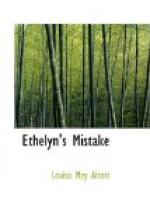All this Richard Markham had said to Ethelyn as they stood for a few minutes upon the beach of the pond, with its waters breaking softly upon the sands at their feet, and the young spring moon shining down upon them like Daisy’s eyes, as the brother described them when they last looked on him. There was a picture of Daisy in their best room at home, an oil painting made by a traveling artist, Richard said, and some day Ethelyn would see it, for she had promised to be his wife, and the engagement ring—Daisy’s ring—was on her finger, sparkling in the moonbeam, just as it used to sparkle when the dead girl held it in the light. It was a superb diamond—even Frank, with all his fastidiousness, would admit that, Ethelyn thought, her mind more, alas! on Frank and his opinion than on what her lover was saying to her, of his believing that she was pure and good as Daisy could have desired, that Daisy would approve his choice, if she only knew, as perhaps she did; he could not help feeling that she was there with them, looking into their hearts—that the silvery light resting so calmly on the silent water was the halo of her invisible presence blessing their betrothal. This was a good deal for Richard Markham to say, for he was not given to poetry, or sentiment, or imagery, but Ethelyn’s face and Ethelyn’s eyes had played strange antics with the staid, matter-of-fact man of Western Iowa, and stirred his blood as it had never been stirred before. He did fancy his angel-sister was there; but when he said so to Ethelyn she started with a shiver, and asked to be driven home, for she did not care to have even dead eyes looking into her heart, where the fires of passion were surging and swelling, like some hidden volcano, struggling to be free. She knew she was doing wrong—knew she was not the pure maiden whom Daisy would have chosen—was not worthy to be the bride of Daisy’s brother; but she must do something or die, and as she did not care to die, she pledged her hand with no heart in it, and hushing the voice of conscience clamoring so loudly against what she was doing, walked back across the yellow sand, beneath the spring moonlight, to where the carriage waited, and, in comparative silence, was driven to Aunt Barbara’s gate.




